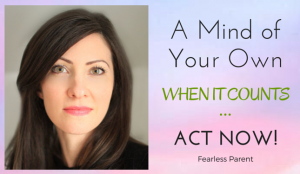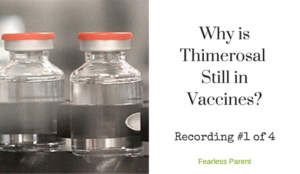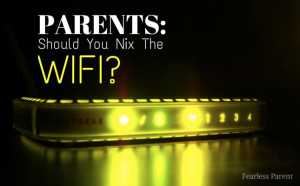by Valerie Borek, Esq.
Our three-part series reviews the many important reasons that we protect religious exemptions to vaccines. In Part 1, we discuss the myriad ways that their denial offends the Constitution. In Part 2, we draw a powerful analogy to forced sterilization to illustrate a very slippery slope when we permit governments to determine who is and isn’t unfit (and unvaccinated). In Part 3, we explore more reasonable steps that can be taken before resorting to the most restrictive and extreme action: the removal of liberty and free choice.
Infringement of rights is a last resort
Not a first.
How do we “know” it is necessary to remove religious exemptions to vaccines? Is there a threat to public health if only one person in a state claimed a religious exemption? What about 3, 300 or 3000?
Is it really beyond discussion that vaccines work, and there are no other ways to achieve better public health? The science is settled? Was it settled 100 years ago? Can it be settled now?
If the case were closed, it wouldn’t be science. It is entirely possible that attempts to quell spread of a disease could cause adverse health reactions or other consequences that we are either not yet aware of, or are not valuing. It is also possible what we believed worked in years past, needs to be re-evaluated as we understand more about our bodies and our world.
Legislatures need to be the vanguards of public health by challenging scientific opinion over and over and over, to ensure it rests in sound, unbiased research, before basing laws upon it. Courts are not the forum to decide as they can only apply the law and the weight of medical and scientific popular opinion. By their functions and constitutional mandates, they are designed to defer both to legislatures and to experts. If you are talking about vaccines in a court room, you’re pushing the boulder uphill, Sisyphus. If there’s more than one way to address communicable disease, we should demand our legislators explore alternatives less restrictive to fundamental rights than mandates.
“But we have no other choice”
Yes, we do. Presenting the issue as: vaccinate OR disease will run rampant, is a false choice.
Immunization is built upon the model that (1) all illness is bad and to be avoided; and (2) one agent causes one disease. However, manifestation of illness is complex and individual. Have you ever been lucky enough to avoid the seasonal flu while everyone around you seemed sick? Scientists and doctors are still wondering why people react differently when they are exposed to the same disease.
Many factors go into manifestation of illness. Nutrition, environmental toxins, stress, hydration, and even beliefs about illness have all been shown to affect whether exposure or harboring disease manifests into symptoms. And exposure doesn’t mean transmission, nor does presence of a disease in the body mean that symptoms will manifest. Disease can spread from infected people, vaccinated people, or simply environmentally.
Each one of the variables I just mentioned offers an alternative that can be explored before attempting to legislate away a person’s religious exemption to vaccination.
Is forced medical treatment the only option?
I’m not one to identify a problem without offering a solution. I’ve said vaccine mandates are an unnecessary and unconstitutional infringement on people. Here are some reasonable and less intrusive alternative approaches:
- Legislators should demand more from their experts. There is growing body of scientific literature, which was introduced many years ago but not pursued, that indicates the one-cause-one-cure approach to immunity, upon which vaccine theory is based, may not be the complete picture for immunity. Fund those studies to find out. And the oft-cited non-existant vaccinated vs unvaccinated? Fund it. How about requiring more post-marketing surveillance, or enabling the FDA to actually monitor and enforce the requirements that are there?
- Legislators should demand more data on vaccine safety. How about an active surveillance system for vaccine adverse events, rather than the passive system we have in place now? This will give us actual data on adverse events, rather than VAERS data that is frequently discredited because if it’s inherent passive structure.
- Let’s examine our food supply, especially for younger children. Are they getting the nutrients they need to fight off disease?
- Do schools have enough funding to have physical education and afterschool programs to encourage children to exercise? (I’m looking at you First Lady; let’s Move on this one.)
- Encourage breastfeeding through law and public policy campaigns. Breast feeding is cheaper and more nutritious than formula. I understand that many women have problems establishing breast feeding, but I also see that these women don’t get a lot of support. We could do a lot more to help these mamas strengthen their family. We can increase resources to create breast milk banks for those that need help.
- Allow or expand a parent’s ability to present proof of natural immunity exemptions.
- It is long known that hospital infections could easily be reduced with proper safeguards. Addressing the problem of medical error and hospital infections will boost health of our population overall and prevent communicable disease spread.
What I am talking about is conservative care, in the public health context. If you’ve ever appealed a denied health insurance claim, you know this is a factor the company considers: before going to extremes did you try less invasive and less costly alternatives?
I just suggested multiple ways a legislature can look at decreasing spread of infectious disease that have nothing to do with vaccines. I suggested research paths that needs to be explored more by the people we deem experts. If I can ask these questions, so can your representative.
But that’s harder work, isn’t it? It’s easier to simply tell everyone to get vaccinated.
Eliminating religious exemptions to vaccine mandates is not only offensive to constitutional principles and fundamental rights, it is also an extreme edict that doesn’t directly address concerns of public health. There are enough questions about alternatives and scientific proof that require our legislators to question taking away fundamental rights, and question whether they should insert themselves between a person and their God.
Vaccine mandates are cowardly
I said it: Vaccine mandates are cowardly. They are fear-based and manipulative. Mandates are the result of our legislators tucking their tails and giving in to their own fears, of not thinking critically, or simply being bought. On one day our legislators vote for anti-bullying laws, and on another they vote to force medical treatment upon unwilling citizens.
Vaccines are marketed and mandated to prevent something that is not guaranteed to happen, or could even be harmless. That’s fear talking.
Recently in Pennsylvania, Representative Mike Schlossberg expressed his disappointment that the measles outbreak is over. “It’s going to take a tragedy to get people on their feet-that’s the nature of public policy.” Mr. Schlossberg hit on one of the most effective and subtle ways government passes massive changes: taking advantage of tragedy and fear.
Our society today is in a chronic state of fear, cradled in expectations of instant gratification. We are encouraged to fear terrorism, disease, crime, not fitting in or having the latest technology to help and guide us through life. Life changes so fast it is hard to keep up. Vaccines are just what the doctor ordered to soothe our fears and nurture expectations of a fast solution.
It is no secret that fear is a catalyst for intrusive government action. Fear generates emotions that activate our limbic system. Our breathing is affected, our heart rate is affected. Blood flow goes away from the brain and toward the extremities, making it harder to form rational thoughts. This is why we are told to take a deep breath when we are feeling intense anger, sadness, pain, and other negative emotions.
Here’s an alternative to the fear-based propaganda surrounding vaccination—how about honest conversation? How about empowerment? Instead, the CDC and professional organizations, and pharmaceutical companies are training doctors in how to scare parents into agreeing to vaccines despite resistance. They’re being trained to scare people instead of answer questions and truly review the science that is there, and not there. When we speak from fear, we speak from emotion. Our health, the health of our children, and of our planet deserve better than fear-based policies. But I’m not holding my breath for an honest conversation from the media, or legislators. We all have a responsibility to think critically, educate, and be the change.
Those who would give up liberty for security understand and deserve neither (you know you were thinking it). Mandating medical treatments, in the face of legitimate questions, is the ultimate in fear-based tyranny. If such legislation is allowed to stand, we will know our Constitution has died the death of 1000 cuts.
 Valerie Borek, Esq has her gloves off on this issue and we are so glad she’s on our team (check out her Fearless Parent Radio guest host page). Valerie has focused her career on empowering parents and strengthening the family. She is proud to be a founding member of the Birth Rights Bar Association. Valerie became involved in birthing rights in 2012 through the encouragement of the midwives that attended her son’s home birth. Check out her blog post here to learn more about what inspired and motivated her to user her legal training to affect positive change in maternity care in the U.S. She lives in Pennsylvania with her partner and their two young boys.
Valerie Borek, Esq has her gloves off on this issue and we are so glad she’s on our team (check out her Fearless Parent Radio guest host page). Valerie has focused her career on empowering parents and strengthening the family. She is proud to be a founding member of the Birth Rights Bar Association. Valerie became involved in birthing rights in 2012 through the encouragement of the midwives that attended her son’s home birth. Check out her blog post here to learn more about what inspired and motivated her to user her legal training to affect positive change in maternity care in the U.S. She lives in Pennsylvania with her partner and their two young boys.













Too bad it was taken away from us in CA… ?
I still have my religious exemption and my child is in public school. I’m in CA
you were grandfathered in, correct? My daughter won’t be in kindergarten until this year. If she had been there last year w/ our exemption on file, she would have been grandfathered in until the next checkpoint (7th grade).
Was this the last year then? I wasn’t fully aware. Yes, I started his last year. Thank you for clarifying for me smile emoticon
yes the 2015-2016 school year was the last year to get your PBE or religious exemption on file to be grandfathered in. The checkpoints are: kindergarten and 7th grade. So if a kid was in daycare last year, trying to enroll in kindergarten this year, they need vaccinations.
see I had no idea. I think we’re going to have to homeschool our girls
https://www.facebook.com/permalink.php?story_fbid=949870951718056&id=116317855073374
Dr. Bob Sears
September 22, 2015 ·
UPDATED VERSION OF NAVIGATING THE NEW VACCINE LAW IN CALIFORNIA
My earlier version of this post had some inaccuracies which have recently been cleared up. Here is everything I know about how to navigate the new law:
SB 277 is a new California law which will go into effect July 1, 2016. It will require all doses of 10 vaccines for all children who are enrolled in a public or private daycare, preschool, elementary school, junior high, and high school. Personal and religious exemptions are no longer allowed; only medical exemptions will be accepted. (Note: while there was no official religious exemption previously, those whose religious practices precluded seeing a traditional medical doctor were allowed to opt out of the previous vaccination law.) There are some exceptions to the new requirements, and many children are “grandfathered” in so that they can remain unvaccinated in school for a while. This is the first time any California law has created a restriction on who may or may not attend public and private school, and it has many parents naturally concerned. The law is stated to go into effect January 1, 2016, but is not to be implemented for school attendance until the July 1 date.
Your will find a number of additional articles on various aspects of this new law on our future website (ImmunityEd.org) and on our Facebook page. This article is intended to help parents understand how this new law will affect their children’s school attendance next year and in the years to come.
Overview of Your Options:
Here is a brief overview of the options that parents who prefer to skip vaccines in whole or in part can consider. More details on each option to follow:
Continue in school without vaccines under the “grandfather” clause which allows children who are already enrolled to remain in school (see below). If this applies to you, you don’t need to do anything except you must submit a Personal Belief Exemption (PBE) form before the end of 2015 if you haven’t in previous years. At this time, about 90% of current schoolchildren with PBEs are grandfathered in for next year and won’t be subject to this bill yet.
It has now been clarified that children can transfer between any daycare and/or school within CA and their PBE goes with them as long as they have a copy.
Continue in school as a “conditional entry,” which means to obtain a written plan from the doctor that outlines when any missing vaccines will be completed, and gradually begin vaccines (see below for more details). You won’t need to do this until next year.
Continue in school utilizing special education services since California is allowing children with special needs who qualify for an IEP to remain in school without vaccines. It was originally thought that children with IEPs could continue all aspects of their education. But now there is some confusion as to whether they can stay on school all day or only attend their special ed classes (see below).
Go ahead and complete the required number of vaccines prior to entering daycare or school (see catch-up schedules below).
Homeschool your child (see below).
Get a medical exemption starting NEXT year.
Understanding your options in more detail:
There are many children who will not be subject to the law and various circumstances (besides medical exemption) in which unvaccinated children will be allowed to continue in school.
First, understand the “grandfather” clause which allows unvaccinated children who are currently in school for this 2015/2016 year to remain in school until they reach a future checkpoint year. These checkpoints typically occur when a child first enrolls in a daycare or preschool, when a child reaches kindergarten, and when a child reaches 7th grade. For example: a child in second grade who doesn’t have all the required vaccines at the time such a law goes into effect can continue to go to school through 6th grade without further vaccines. Upon enrollment into 7th grade, a child would need to either be caught up on all missing vaccines, begin to catch up on missing vaccines (called a conditional entry, see below), or obtain a medical exemption. Another example: a teen enrolled in 7th grade or above for the 2015/2016 school year will also not be subject to this bill; he or she can continue through high school without vaccines. Preschoolers can continue without vaccines (if enrolled with a PBE this coming school year) until Kinder. If enrolled in a TK this coming year, you are also grandfathered until 7th grade.
We now know children can change schools and keep their PBE. Moving from 8th grade to 9th grade (or junior high to high school) allows a child to keep the PBE exemption, even if switching physical school locations. You can change districts or go from private to public or vice versa and keep the PBE as long as you have a copy
Second, it is useful to note that states which mandate vaccines for daycare or school attendance can’t actually mandate vaccination during infancy. The mandates are only enforced when a child is enrolled into a daycare or school. Families who prefer not to vaccinate during infancy do not need to do so; vaccines can be deferred until a later date as detailed in the section to follow (Vaccine Schedules to Meet Daycare and School Requirements).
Third, realize that the list of vaccines required for school is actually shorter than the number of vaccines on the CDC schedule. For example, in California only six out of the twelve vaccines are required: DTaP, Polio, Hib, Hep B, MMR, and Chickenpox. The other six vaccines are optional.
Fourth, some states (like California) allow what is called a “conditional” entry into school. This means that a child who hasn’t met the vaccine requirements can still be enrolled as long as a plan to eventually complete vaccination is in place. Such cases would typically need a written letter from the child’s doctor that outlines the plan. Children may be able to spread the required vaccines out over a few years and proceed gradually if the school is flexible. See the last section at the very end for more information. This option would apply to those who don’t qualify for a medical exemption and have no other option.
Fifth, a concession was originally made by the lawmakers in California that children who qualify for an Individualized Education Plan (IEP) will not be subject to the mandatory vaccination law. This was supposed to mean that most children with special needs (mainly for intellectual impairments or learning disorders) would be allowed in school regardless of vaccine status. Certain laws were already in place which protect the rights of such kids to have equal access to education. This may not be the case in all states.
However, this allowance has recently come into question by the Orange County Department of Education. This department stated that the language of the law only allows children with IEPs to receive their special education services, but not their regular classroom time. The Dept also advised schools to seek a court order to require such children to be vaccinated.
However, we have testimony during the CA Assembly Health Committee Hearing from a representative from the California Department of Education that assured us very clearly that children with IEPs would be allowed to attend all their classroom time and not have to comply with the new law. This dispute is expected to be clarified in the weeks to come and further information will be forthcoming.
Medical exemptions to vaccination:
The guidelines for providing medical exemptions are extremely broad in the new California law. Parents, physicians, legal experts, and some legislators fought to have the term “contraindication” removed from the guidelines, and succeeded. This means that is it up to the personal judgement of each physician and patient to work together to determine if a child qualifies for a medical exemption. The California bill declares that an exemption can be granted if “the physical condition of the child is such, or medical circumstances relating to the child are such, that immunization is not considered safe, indicating the specific nature and probable duration of the medical condition or circumstances including, but not limited to, family history, for which the physician does not recommend immunization . . .”
I recommend AGAINST seeking medical exemptions at this time because most people won’t need one. The grandfathering clause is the best guarantee at this time if it applies to your child. A medical exemption can be challenged. I don’t see any benefit in trying to secure a medical exemption right now years before you may need one. They are not going to take that right away. If they do, then all medical exemptions could be made null and void regardless of when you got them. Getting one now may not help you. I urge people to not overload the system with medical exemptions now. Wait until your grandfathering time has run out. Let those who really need one get one for the next school year.
Here are some of the circumstances which might prompt a doctor to grant a legitimate exemption for a child or family:
A child with a severe vaccine reaction already.
Siblings of a child who had a severe reaction.
Children of a parent who had a severe reaction.
More distant relatives with a severe reaction.
Reactions that occur in grandparents, aunts and uncles, or cousins are less of a concern as the genetic risks are not as closely shared. However, parents can and should discuss this with their physician.
Current severe medical conditions or chronic conditions. Children with any chronic medical condition or temporary moderate to severe condition can discuss with a doctor whether or not that condition warrants temporary or permanent exemption.
Family history of severe medical conditions. There is a growing body of research which is finding a small link between vaccination and increased risk of autoimmune disease. Families with lupus, rheumatoid arthritis, celiac disease, fibromyalgia, multiple sclerosis, type I diabetes, and other autoimmune conditions can discuss exemptions. Families with neurodevelopmental or psychiatric conditions can also discuss this with their doctor. The greater the number of familial diseases, and the closer in the family they occur to the child in question, the more likely is the need to consider medical exemption.
Autism in the family. Despite the lack of published mainstream evidence of a connection between vaccines and autism, many families will consider seeking exemptions for a child with autism and the rest of their children. Autism in more distant relatives would be less of a concern for a baby but can be considered.
Other learning and behavioral disorders in the family. Disorders that are less severe than autism, such as ADHD, ODD, and others, are less of a concern but warrant consideration by families and their doctors.
Allergies in the family. This is perhaps one of the most common disorders for which families may try to get a medical exemption. If a family’s challenges are significant, such as multiple close family members with asthma, eczema, and life-threatening food allergies, consideration for exemption could be valid. Yet, some may go a little overboard, such as having a second cousin with asthma, or having a child who is “sensitive” to sugar.
Genetic abnormalities in a family. There is a growing trend to perform genetic testing on families to evaluate current medical problems and to predict future health risks. Some have theorized that genetic defects that impair detoxification and antioxidant function in the body may increase the risk of severe vaccine reactions. It is important to know that no research has yet been done to determine if this is true. One particular gene variation which exists in most families with autism is called the MTHFR gene, and many such families believe this gene defect warrants medical exemption from vaccines. Until research supports this theory, this couldn’t be used as a definite reason for exemption. Doctors certainly have the right to consider anything they want to. But I can’t find any medical justification for this yet.
It is not my intention to claim that the above scenarios all deserve a medical exemption from vaccines. I simply list the most common reasons that patients have discussed with me and opinions that various colleagues have shared with me. This issue has not yet been sorted out by research.
In California, no specific form to fill out exists at this time; the exemption is simply a letter from the doctor. It must specify the reason for the medical exemption (for example, the child has a family history of autoimmune disorders) and the duration of the exemption (for example, for the rest of childhood or for only a few years).
The OC Dept of Education interpretation actually states two additional opinions on medical exemptions.
First, the school is directed not to determine if the medical exemption is medically appropriate or not. The school is directed to accept the letter and the doctor’s opinion, as long as the letter has the required information. Second, a child may follow a partial or a delayed vaccination schedule and still receive a medical exemption for other aspects of the vaccination schedule. This process would be extremely complicated, and I cannot offer any guidelines here at this time.
Bottom line, it is imperative that all families and doctors operate within the guidelines of the law and the standard of medical care. I would say that at this time there is no certain medical standard of care on this issue. That will evolve over time. We can all work together on this. There’s no reason whatsoever to go outside of the law, no matter how angry you are.
Homeschooling
Home-based education was already becoming more popular before mandatory vaccination laws were introduced. Some families embrace this lifestyle, and many children and families thrive outside of standard educational systems. These new laws will prompt more families to make this choice.
Homeschoolers don’t necessarily need to be isolated and educated alone one-on-one with a parent as a full-time teacher. Co-op programs, in which families group their children together for educational, social, athletic, and cultural experiences will become more popular. Parents won’t be the only ones responsible for teaching; they can share duties with other parents, tutors, even private teachers, and such costs can be shared among many families. Parents should be able to work part-time outside the home if desire or needed.
Hybrid programs, in which a child has some days at home and some within a school-like classroom environment with other kids, are claiming that they are officially a type of home-schooling and therefore not subject to the law. Investigate such programs in your area to see if there is one that is right for your child.
The OC Dept of Education offered some additional clarification in this matter: If the teacher possess a valid teaching certification, then such group classes would be considered real classroom based instruction and therefore not be allowed.
Perhaps the opposite, then, would be what homeschooling or hybrid programs would need to follow to allow unvaccinated children to attend group teaching – they would have to make sure the class was taught by an unlicensed instructor.
This issue ultimately is unclear at this time, and should be worked out in the years to come. Parents who are considering hybrid homeschooling should proceed with such plans and make their own vaccination choices for now.
Vaccine schedules to meet daycare and school requirements
Remember, parents who suddenly find themselves needing to register an unvaccinated or under-vaccinated child for daycare or preschool NEXT YEAR can begin school with a “conditional entry” as described above, and expanded on at the end of this piece. Kids don’t need to wait until all doses are complete before they enter school.
Vaccinating to meet daycare or preschool requirements (in a previously-unvaccinated child):
4 DTaP
3 Polios
3 Hep B
1 Hib*
1 MMR
1 Cpox
*Note: only 1 HIB is needed for infants 15 months and older.
Also note: a 5th dose of DTaP and a 4th dose of Polio aren’t needed as long as the last doses of each are given at 4 years of age and older.
This process would take about one year to complete. This schedule could be started at any age in preparation for daycare or preschool. The spacing between any of these doses can be prolonged without compromising effectiveness. If a child already had some vaccines during infancy, but then the process was halted, parents would cross each previously-administered vaccine off of the above list and simply begin the schedule with whatever is remaining.
Vaccinating to meet kindergarten requirements (in a previously-unvaccinated child):
4 DTaP
3 Polio
3 Hep B
1 HIB*
1 MMR
1 Cpox
*Note: HIB is only approved by the FDA to be given prior to a child’s 5th birthday. If a child turns five before this school requirement is enforced, he or she won’t need this vaccine.
**Note: For kindergarten, two doses of MMR and Chickenpox are normally required. However, for most children, one dose works well enough. Families who are trying to minimize the number of vaccines can get a blood test a few months after the first doses to see if they worked. If so, second doses wouldn’t be needed. If the blood test shows the first dose failed, the second dose can be given at anytime thereafter.
Vaccinating to meet requirements for kids seven through eleven years (in a previously-unvaccinated child):
1 Tdap*
3 Hep B
3 Polio
1 MMR
1 Cpox
Note: Kids 7 years and older can’t get DTaP, and they can’t get a series of Tdap. Tdap is only approved as a single dose.
Vaccinating to meet requirements for teenagers and older (in a previously-unvaccinated child):
1 Tdap
3 Polio
1 MMR
1 Cpox
Notice that this is the smallest of all schedules. This is because some states, including California, do not require the Hep B vaccine for teens. Don’t forget, a child will need a blood test to prove the MMR and Chickenpox vaccines worked, or get a second dose.
What can you do if you cant get any exemption but still don’t want to vaccinate and can’t home school and can’t move?
Ultimately, some families will be out of luck and will need to either move or work the system within the confines of the law. Here are some thoughts:
Homeschool during preschool and kindergarten since full vaccination isn’t a consideration for you.
Explore the schools in the area to learn which are more friendly toward families who submit medical exemptions, as these schools are likely to also be more lenient with conditional entry plans (such as public charter schools or small private or religious schools).
Enroll the child into school around seven years of age with a conditional entry plan from the doctor which outlines a vaccine plan which will begin at some point in the near future.
When the school insists that the child begin following the conditional entry plan, do the first vaccine on the seven-year-old schedule above, which would be Tdap.
If the child has a moderate to severe reaction, discuss medical exemption from further vaccines with the doctor.
If no significant reaction occurs, which is very likely to be the case, wait until the school indicates it is time to continue the written plan and then do the first polio vaccine (just polio, not Hep B; see reasoning below). Continue slowly vaccinating as the school prompts you too. Remember, school officials are busy and may not have the time to keep on top of your child’s plan. It’s your responsibility as a parent to make sure you keep checking the vaccine plan so your child doesn’t fall behind. If this process is drawn out until 7th grade, the child will not be required to get the Hep B series. You will need a blood test a few months after completion to make sure the MMR and Chickenpox vaccines worked.
At any point along the way, if the child catches chickenpox, be sure to have it documented with an in-person visit to the doctor (who will usually see the child outside the office to avoid spread of the disease). The vaccine will then not be needed. If repeated exposures to chickenpox have occurred, and the child has not caught chickenpox, a blood test to check immunity could be done in lieu of vaccination.
The child will eventually meet all the vaccination requirements (1 Tdap, 1 MMR, 3 Polios, and possibly 1 Chickenpox) and continue to remain in school.
I want to make it very clear that it is important to work within the guidelines of all rules and laws regarding vaccines and education. Work closely with school administrators and medical providers to find the best educational lifestyle for everyone involved.
WHAT SHOULD YOU DO RIGHT NOW?
If your child is grandfathered in, don’t do anything at this time other than stay in the same school if possible. Be sure to get in a PBE form before 2015 ends. When the grandfathering time runs out (your child reaches kinder, 7th grade, or you have to change school districts perhaps), make an appointment with a doctor to discuss other options.
Get your kids enrolled into school this year so they can be grandfathered. Don’t change schools.
If your child has an IEP, don’t do anything. Stay in school. Never let that IEP go. Your child can remain unvaccinated if the new uncertainties with interpretation of the law are worked out. For now, hold tight. Contact your Assemblymember’s office for help. Also, contact Senator Allen’s office (find the number online) and ask for help since he played a role in writing this law.
If you feel your child may qualify for a medical exemption, and is NOT grandfathered in, make an appointment with a doctor to discuss a medical exemption. Please don’t ask for one if your child has another way out at this time (grandfathered).
If none of these options are available, but you still are trying to opt out of vaccines, make an appointment to discuss a conditional vaccine plan that will at least get your child started in school.
Dr. Bob
You are so welcome! Best of luck!!! ❤️
Great point, it should not be beyond discussion whether or not vaccines work to prevent disease in the first place, a topic commonly omitted. the accusation of being “anti vax” is really not the issue at hand – it’s “pro immune system”.
As a person of faith, I feel that people are abusing religious exemption when they are not religious in any way, but want an out of the vaccines. I fear that this is going to lead to more states wanting to strip people of the right of taking religious exemptions.
It should be a personal belief exemption, and it should not have to be “religious”. Everyone should have the right to accept or reject offered medical treatments–as a measure of bodily autonomy and medical freedom. If disease outbreaks occur, it would not take long for people to flock to vaccines (assuming it is believed they would be an effective measure). There is no need for all of this coercive medicine (unless your accountants are helping you increase the bottom line on your Income Statement).
The whole notion of compulsory vaccination is fascist!
Don’t give up your religious rights!
anyone here get a positive titer to mumps? I avoided the second mmr with his scary high measles titers, yet zero to mumps and rubella..doc advised a singer mumps shot, it isn’t available, he suffered for four months with gastro pain and developed arthritis in his knees so we don’t want to offer him anymore measles portion.